Again, I don’t have any writing to share with you, but I do have a few picture from my backpacking trip and a tag! (Also I am seriously inspired by Les Miserables— I am reading the novel right now– and I am going to write some amazing short stories soon! Or at least, so I hope.)
Last weekend, I went on my annual backpacking trip with my father. However, this time, we brought my little sister and one of my best friends and her dad along for the three day trip! This was my third time backpacking on this trail, and it was fantastic like always.
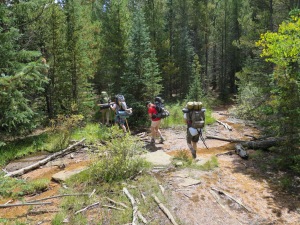
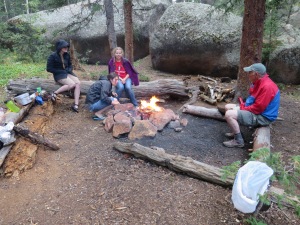

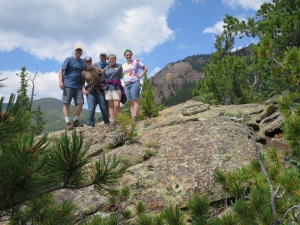

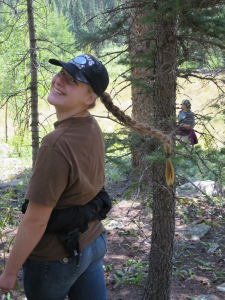

Overall, it was an amazing trip.
Also last week, I was tagged by Gemma Fitz who is one of my writer friends; in my Camp Nanowrimo cabin this past July, I got to be inspired by her . She is an awesome and enthusiastic person. You guys should really check out her blog: Chasing Daisies.
Anyways, she tagged me for the Milk Tea Book Tag. I’m not sure what Milk Tea is, but I had to list some of my favorite books in certain categories.
 Tea: The Foundation of my Reading
Tea: The Foundation of my Reading
The Magician’s Nephew by C. S. Lewis
Though The Horse and His Boy is my favorite Narnia book, I first started my reading journey with Digory and Polly. My parents had been reading the Narnia books to me ever since I could remember, and when I was in kindergarten, I read The Magician’s Nephew by myself for the first time. I have not been able to stop reading since, and the Narnia books still have a special place on my shelves.
 Milk: A Smooth, Rich Book
Milk: A Smooth, Rich Book
Till We Have Faces by C. S. Lewis
Another Lewis novel! Can you tell who is my favorite author yet? Anyways, Till We Have Faces is an incredibly deep story of two sisters: Orual and Psyche. Though it is the retelling of a Greek myth, I have never seen a book have such a powerful and honest reflection of Christianity. And Orual is such a well rounded heroine with all her flaws, struggles, and strengths. Oh, and of course, C. S. Lewis’ writing is always a pleasure to read.
But I have to say that Tolkien’s Children of Hurin, Mary Shelley’s Frankenstein, and Alexandre Dumas’ Count of Monte Cristo almost tied for this category. Those are all so fantastically written and have such powerful stories. I can’t really choose.
 Sugar: A Book I Love but is Controversial
Sugar: A Book I Love but is Controversial
Crime and Punishment by Fyodor Dostoevsky
Most people do not enjoy this book– I did not expect to, but by the time I finished the final epilogue, I discovered that I enjoyed the ideas and debate which this book brought up. I would even say that I enjoyed the book, in the end. Now most people don’t like reading about an intelligent character who commits murder and almost goes insane. But– in a twisted way– I could almost connect with Raskolnikov (maybe because I am a twisted INTJ, but I do know another INTJ who hated this book….) Anyways, I love writing about the ideas in this book, and I was really happy with the final, surprising Christian twist.
 Ice: A Book just for Fun
Ice: A Book just for Fun
Percy Jackson: The Last Olympian by Rick Riordan
Even though I objected to several things in this book that do not fit with my Biblical worldview, I enjoyed this book immensely. The writing was simple but fun and sarcastic, and the main characters were entertaining and easily to connect to. (My favorite characters are Nico and Luke– yes, I know about what the author did with Nico in the following series: see my note about my objections– beyond the fact that I felt like it was a shallow conclusion to Nico’s struggles with depression.)
 Silk Socking: A Book that is Much Better than it Sounds
Silk Socking: A Book that is Much Better than it Sounds
The Clone Commando Series by Karen Travis
What? A Star Wars rip off novel? Seriously?
No. This series of five books (Hard Contact, Triple Zero, True Colors, Order 66, and 501st) has one of the best modern world building I have ever seen and debatable the best cast of characters I have ever read (seriously, the character development might rival Tolkien’s in my opinion.) Imagine a cast of dozen of main characters and 90% of them all look identical– literally, they are clones. Now imagine that each of those characters has a distinct personality and character arc. Beyond that, the author built this culture around Jango Fett called Mandalorian, and it was fantastically done! And then the author poses all sorts of deep questions about the end justifying the means, hypocrisy (in the most loved characters, too), and even has suttles pro life messages. Read this series. Read it. You won’t regret it.
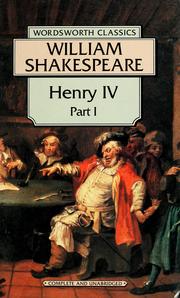 YingYang: A Book with Foreign Influence
YingYang: A Book with Foreign Influence
King Henry IV Part 1 and 2 by William Shakespeare
I had a bit of trouble with this category, but I would say that Shakespeare has foreign influence, right?
Anyways, these two plays (and King Henry V) are some of my favorite books and probably my favorite Shakespeare plays (though I love Hamlet, too.) The character development is amazing– some day, I want to write a character arc like Prince Hal’s. Hal’s redemption from good-for-nothing, errant youth to a noble, thoughtful warrior king is fantastic. And the speeches! They are so inspiring and beautiful.
My favorite scene in Part 1 had to be Harry Percy’s (Hotspur) and Prince Hal’s/Harry’s/Henry’s duel. Can you beat the death speeches of Act 5 Scene 4? Anyways, I have put a small quote here that was part of Hal’s response to Harry Percy’s death.

My favorite scene is the 2nd part was Prince Hal’s soliloquy and the following conversation between King Henry IV and his son just before the king died. And then there is Hal’s speech, as King Henry V, to Falstaff. I loved the conclusion to Hal’s character arc, and it is summed up in one line: “But, being awaked, I do despise my dream.”
_______________________________________________________________
Sorry for my rambles up there, but I feel very passionately about these books 😛 Especially anything Lewis or Shakespeare. Anyways, I am nominating Raychel Rose, Grace, Bryce Lowe, and Ashley-Anna. Anyone else is welcome to do this tag, and for those of you whom I called out, please don’t feel obligated to do this tag.
God bless,
Gabrielle

Thanks for tagging me! Great post btw:)
LikeLike
You’re welcome! I can’t wait to get to know you better over this school year and see what your favorite books are. 😉
LikeLiked by 1 person
Thanks for doing the tag!! Other the Magician’s Nephew (my favourite Narnia book!!) I haven’t read any of these books, but almost all of them are on my TBR list.
And your camping trip looks awesome.
LikeLike
You should definitely read the others– especially Till We Have Faces and the Clone Commando books. I would probably recomend Crime and Punishment last though– it is highly likely that you won’t enjoy it. Even I did not enjoy many parts.
LikeLike
Awesome pictures! That actually looks like around Leavenworth. We went on a hike there once… And mistook the hard trail for the easy one. XD
We were practically saying “only a few more minutes and we’ll reach the end” for 2 hours. 😛 But it was fun anyway.
LikeLike
Ugh! I know what you mean! The first time I went backpacking, we took a 5 mile hike in that consisted of constant switchbacks and was extremely steep. My dad mistakenly thought we were three miles into the hike when we were really only a single mile in; it was terrible. Then we realized that there was a trailhead on the other side of the trail that started a 7 mile almost flat hike to the same spot where we camp. 😉 Humorously, this time backpacking, we met a group who optimistically told us that they were only a mile from the other side (they had climbed in the hard way); we had to break the news that they were eight miles out. As terrible as it sounds, I was amused by their agast faces.
LikeLike
I might have liked Crime and Punishment if it was around 200 pages. It had a premise that could have been interesting, but I don’t like where the Dostoyevsky went with it, or how he drug it out.
LikeLike
Very true, Zane. I won’t claim that I enjoyed all of Crime and Punishment or that it is without fault. However, overall, I did find it intellectually stimulating; I enjoy talking about it more than I enjoyed reading it.
LikeLike
I can agree with that, except that Raskolnikov’s idea was bonkers to begin with, so I didn’t get much intellectual stimulation out of it until the discussions. I definitely got some enjoyment from talking about it.
LikeLike
Great post! I love Crime and Punishment: Raskolnikov is one of my favourite characters ever and I loved all the philosophising Dostoyevsky did. It’s a deep, thoughtful book on so many levels.
LikeLike
I am so excited that you love Raskolnikov, too! Most people don’t. I really enjoyed reading about Raskolnikov– even though he falls almost into insanity. I guess I could see myself in him, and I enjoyed how he thought, even though I disagreed with him.
LikeLike
How are you liking Les Miserables so far? I have it on my to be read list, but I haven’t started it yet because I never thought I would be able to get into it.
LikeLike
Oh, I am loving it. I think Les Mis is going to be one of my favorite books ever. I love the characters (Enjolras is probably my favorite character of all time) and the deep philosophical commentary is really inspiring for thought. However, there are some parts that are seriously irrelevant and drag. I have never skipped chapters in a book before, but I did skip a few parts in Les Mis (I am ashamed of myself….) But don’t let that hold you back! It is better to skip the chapters that are boring than to never read the book. 😉 Really, the story starts getting interesting in book “Marius” and the final two books “Saint Denis” and “Jean Valjean” are really the best in my opinion.
LikeLike
Skipping chapters??? How can you do this to yourself? Yes, it’s better to skip chapters than not read it if it is worth reading, but I can’t even imagine skipping chapters in a novel. How is it one of your favorite books, and at the same time the first one that made you skip chapters?
Celia, are you Celia H******, by any chance?
LikeLike
I know. I am a bit ashamed (and fully plan to go back and read those chapters some day), but let me explain!
This novel is one of my favorite stories of all time because of characters like these (Enjolras is now my favorite character of all time, by the way; I think you would really like him, Zane): This chapter takes only five minutes to read, and it describes a set of nine characters in a very beautiful manner.
And because there are scenes like this: (Picture is from Pinterest, but the text underneath is from the novel)

And quotes like this:

(This picture is also from Pinterest)
And scenes like this:
Le Cabuc [a man at the barricade] took his gun and aimed at the porter; but as he was below, and as it was very dark, the porter did not see him….. The shot was fired; the ball entered under his [the porter’s] chin and came out at the nape of his neck, after traversing the jugular vein….
“There!” said Le Cabuc, dropping the butt end of his gun to the pavement.
He had hardly uttered this word, when he felt a hand laid on his shoulder with the weight of an eagle’s talon, and he heard a voice saying to him: “On your knees.”
The murderer turned round and saw before him Enjolras’ cold, white face.
Enjolras held a pistol in his hand.
He had hastened up at the sound of the discharge.
He had seized Cabuc’s collar, blouse, shirt, and suspender with his left hand.
“On your knees!” he repeated.
And, with an imperious motion, the frail young man of twenty years bent the thickset and sturdy porter like a reed, and brought him to his knees in the mire.
Le Cabuc attempted to resist, but he seemed to have been seized by a superhuman hand.
Enjolras, pale, with bare neck and dishevelled hair, and his woman’s face, had about him at that moment something of the antique Themis. His dilated nostrils, his downcast eyes, gave to his implacable Greek profile that expression of wrath and that expression of Chastity which, as the ancient world viewed the matter, befit Justice.
The whole barricade hastened up, then all ranged themselves in a circle at a distance, feeling that it was impossible to utter a word in the presence of the thing which they were about to behold.
Le Cabuc, vanquished, no longer tried to struggle, and trembled in every limb.
Enjolras released him and drew out his watch.
“Collect yourself,” said he. “Think or pray. You have one minute.”
“Mercy!” murmured the murderer; then he dropped his head and stammered a few inarticulate oaths.
Enjolras never took his eyes off of him: he allowed a minute to pass, then he replaced his watch in his fob. That done, he grasped Le Cabuc by the hair, as the latter coiled himself into a ball at his knees and shrieked, and placed the muzzle of the pistol to his ear. Many of those intrepid men, who had so tranquilly entered upon the most terrible of adventures, turned aside their heads.
An explosion was heard, the assassin fell to the pavement face downwards.
Enjolras straightened himself up, and cast a convinced and severe glance around him. Then he spurned the corpse with his foot and said: “Throw that outside.”
Three men raised the body of the unhappy wretch, which was still agitated by the last mechanical convulsions of the life that had fled, and flung it over the little barricade into the Rue Mondetour.
Enjolras was thoughtful. It is impossible to say what grandiose shadows slowly spread over his redoubtable serenity. All at once he raised his voice.
A silence fell upon them.
“Citizens,” said Enjolras, “what that man did is frightful, what I have done is horrible. He killed, therefore I killed him. I had to do it, because insurrection must have its discipline. Assassination is even more of a crime here than elsewhere; we are under the eyes of the Revolution, we are the priests of the Republic, we are the victims of duty, and must not be possible to slander our combat. I have, therefore, tried that man, and condemned him to death. As for myself, constrained as I am to do what I have done, and yet abhorring it, I have judged myself also, and you shall soon see to what I have condemned myself.”
Those who listened to him shuddered.
“We will share thy fate,” cried Combeferre.
“So be it,” replied Enjolras. “One word more. In executing this man, I have obeyed necessity; but necessity is a monster of the old world, necessity’s name is Fatality. Now, the law of progress is, that monsters shall disappear before the angels, and that Fatality shall vanish before Fraternity. It is a bad moment to pronounce the word love. No matter, I do pronounce it. And I glorify it. Love, the future is thine. Death, I make use of thee, but I hate thee. Citizens, in the future there will be neither darkness nor thunderbolts; neither ferocious ignorance, nor bloody retaliation. As there will be no more Satan, there will be no more Michael. In the future no one will kill any one else, the earth will beam with radiance, the human race will love. The day will come, citizens, when all will be concord, harmony, light, joy and life; it will come, and it is in order that it may come that we are about to die.”
However, between beautiful scenes like that, Victor Hugo spends around NINE chapters describing the complete history of the Parisian sewage system (architecture included) and around TWELVE chapters talking about the politics and history behind Napoleon’s battle at Waterloo just so that the reader knows that Marius’ father was saved accidently by Thanedier. I heard that Hugo was paid by the word that he wrote, so he interrupted the plot to write about a bunch of random stuff. I was willing to read through the six chapters discussing the Parisian gamin, but not the ones about the sewers. One day, I will read those chapters, but I didn’t have the patience the first time I read the book (especially when there are two characters in imminent danger.)
LikeLike
Thanks Gabrielle, I do think I well read this book at some point when I have some more time. I actually have the whole book on audio, but starting a book that is over 60 hours long is a bit intimidating. 😉
LikeLike
I know! I origional was going to listen to Les Mis on audio, but then I almost gave up (who has 60 hours to listen to a book!) So I stole a friend’s hard copy instead 😉
LikeLike
@olorim
Indeed I am.
LikeLike
Happy birthday!
LikeLike
Thanks, Zane. 🙂
LikeLike